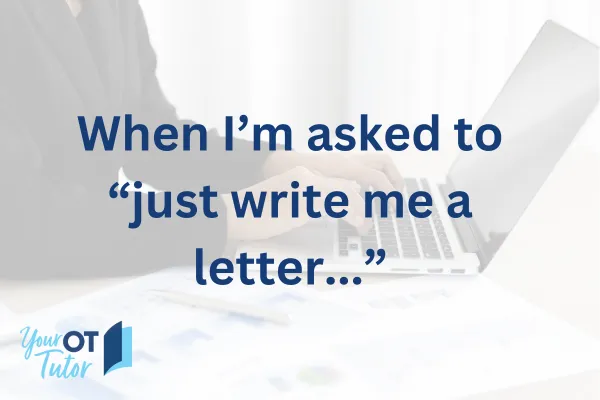THE YOUR OT TUTOR BLOG
Articles on important topics for occupational therapists...

When I’m asked to “just write me a letter…”
If you’re an OT working in the NDIS, chances are you’ve had this request at least once…
“Can you just write me a letter for (insert random item)?”
Many OTs get frustrated with these requests – fair enough, it can feel like someone is telling you how to do your job! While it’s tempting to politely decline and leave it at that, this will probably lead to another OT getting the same request.
So, here’s what I do instead…
1. Go back to the functional issue
When you get these requests, it shouldn’t be a simple “yes” or “no.” Rather than asking more about why they want the item, I start with “What is the activity you are having difficulty with in the first place?” Because at the end of the day, a successful outcome isn’t whether the item is provided, but whether the person’s function or participation has improved. It’s also essential to start with this question, because the justification in any letter we provide (if we do decide to provide one) should be based on how the support will improve the participant’s function and participation.
2. Hear the participant’s opinion
Rather than leading with your own statement about whether you think their request is appropriate or not, take a more client-centred approach. Once you know what functional difficulty they are having, ask them why they feel the item will help them with that difficulty. Then ask them whether they have tried any other options before. You may be thinking “hmm, I’ve got a better option for that functional difficulty,” but maybe they’ve already tried it and ruled it out. Find out exactly what they tried, how long they tried it for, and how long ago they tried it.
3. Decide if the support is actually going to work!
Based on the participant’s answers to all those questions, you may already know the answer about whether the support is clinically beneficial – that is, will it actually work! For things like assistive technology though, you may not have the answer yet.
It could be that the participant has heard that the NDIS will fund certain things (e.g. iPad, swimming lessons, home modifications), but they haven’t actually explored all the other options or trialled the item themselves. We need to have objective evidence that it will work to maximise the chances that the request will be approved. There are many ways you can do this, such as referencing literature, but one of the most important ways will be to actually trial the item (or do some sort of simulation if a trial isn’t feasible). During the trial collect data about how it improved your client’s function and/or participation (not just how it improved symptoms or body functions).
By this stage you will know whether the requested item is likely to be beneficial, but it doesn’t necessarily mean the NDIS will fund it.
4. Consider the reasonable and necessary criteria
Sometimes supports or assistive technology can be beneficial for your client, but it doesn’t mean the NDIS will fund it. It could be that they see it as the responsibility of the health system, or something that the parent/family should purchase, or that it is just an everyday expense that anyone without a disability would need too. For the NDIS to fund it, you need to determine if it meets all the reasonable and necessary criteria, especially these ones:
Is it needed as a result of their disability? It has to be a cost due solely and directly as a result of their disability needs.
Is it effective? This is where your objective evidence from any trials or other information gathering is essential!
Is it value for money? What devices do they already have that could be used to solve the functional difficulty? What other supports are already funded that may do the same job? Have you ruled out less expensive models/options rather than jumping straight to top-of-the range?
Handy hint: A great way to pre-empt what evidence you’ll need to provide to support a request, especially if it’s something that the NDIS may not always fund, is to check out the “Would we fund it” NDIS webpage. Click here for a quick video I made about it.
5. Make your decision
Now you need to decide if you will write the letter or not. If I get through all these steps and the requested item is NOT my recommendation, I will:
Explain why
Give the client an opportunity to add more information or ask me questions
Provide my alternative recommendation – sometimes this is a different item, or a different funding source
But I won’t write a letter. And they may choose to go elsewhere.
But, if I go through all those steps (it may be quicker than you think) and my recommendation is that the item they were after is the right solution, then yes, I will write a letter. But in this case, it has been a joint process between myself and the client, based on sound clinical reasoning and consideration of what is reasonable and necessary.
Hopefully there were some helpful tips in there for you, but here’s a couple of bonus ones for those still reading:
Explain to the client why these steps are necessary before you start any work.
Sometimes more than a letter is needed. It may be an AT application, home mods application, or a full Functional Capacity Assessment report.
If you found this article helpful, you’re probably going to love the latest online course I have planned – it’s called “Managing Challenging Situations in the NDIS”. I’ll cover the “just write me a letter” scenario, plus four others, including how to prioritise a client’s huge “to-do” list and how to manage complaints. This course will be relevant for ANY allied health professional working in the NDIS. This course is coming this month, so join the waitlist now so you don’t miss out on the launch offer!
Clare Batkin - Your OT Tutor
P.S. Are you still looking for ways to be a better OT that loves what they do? Here are 4 ways that I can help you:
· Check out my Learning Library full of resources and courses
· Sign-up for one-on-one or group training and support
· Book a time for a chat to see how I can help
· Sign-up for Your OT Tutor membership - coming soon - put in your EOI here!
And to find links to all my best stuff in one spot, click here!!
#OccupationalTherapy #NewGraduate #NDIS #YourOTTutor #Assistive Technology






